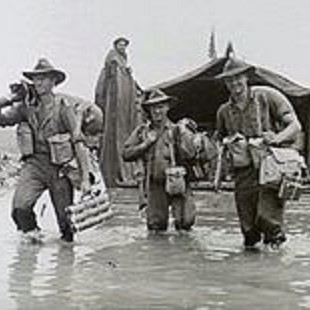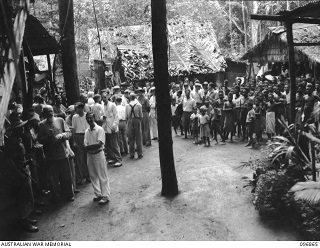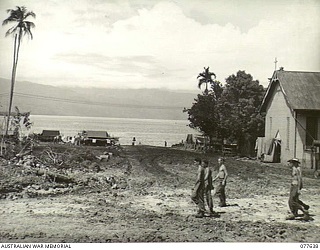Ted Harris MSC, 80th anniversary of his self-sacrifice
EDWARD HARRIS msc
Date of Birth 19 07 1905
First Profession 26 02 1934
Ordination 23 07 1939
Date of Death 21 12 1942
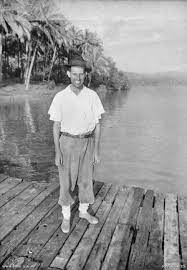
The story of the execution of Fr Ted Harris msc, by the Japanese military in World War ll may not be well known. This year marks 80 years since his death. For the MSC he is one of our Saints.
For those who would like to know more, use the search engine for Current News, Ted Harris, 75th Anniversary. John Dawes published his story in Every Man for Himself.
Edward Charles Harris was born in London, UK, his family coming to Sydney when he was seven. He attended Christian Brothers Balmain, where a Lourdes Grotto is erected in his memory. He graduated from Sydney University (Law) and then entered the MSC.
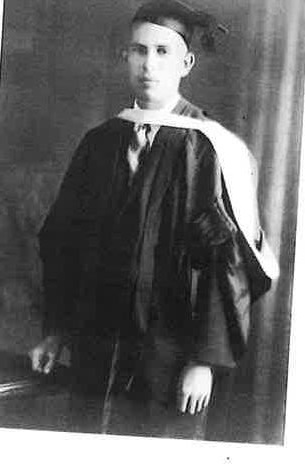
Graduation
In 1933 he entered the novitiate, where his novice master commended him for his humility and complete lack of pretence to intellectual superiority, despite his obvious ability. He took his first vows as an MSC on February 26, 1934.
Ted then began studies in philosophy and theology at Kensington monastery, where his Prefect of Studies saw him as a natural leader, who was 'a power of strength in keeping or building up an excellent spirit in the scholasticate". ln 1939 the scholasticate was moved from Kensington to Croydon in Melbourne: Ted, as senior student, provided leadership in improving the living facilities of the new monastery.
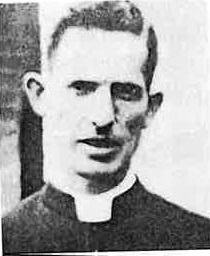
Ted was ordained by Archbishop Mannix in St Patrick's Cathedral on July 23, 1939 at the age of 34. Sadly, his mother had died during his scholasticate, but his father and other family members were able to be present for this special occasion.
Shortly before his ordination he wrote to his religious sister Eve who was not able to attend his ordination:
Pray for me that I may prove a worthy priest; that is my only
wish about it aII, that I do not disappoint Our Lord. ... I came
into religion to serve Him and draw a little closer to Him. If I
do that I'll have everything. If I mess that, weII, the rest will
be worth little. The LittIe prayer that I am putting at the foot of
my ordination card expresses ... my only desire: "Mary, unite
his heart to the Heart of thy Divine Son"
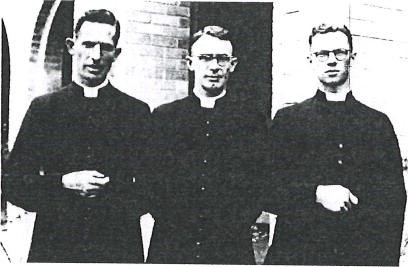
Ordination group 1939: From Left Ted Harris, Brendan Sykes, Jim Carlton
It is said of Ted, that he was a strong, courageous character, with great leadership skills, he was looked up to by fellow students, the Australian soldiers and the local people of New Britain. Ted taught briefly at Downlands and in 1941 was appointed to New Britain, PNG.
On arrival in Rabaul, Bishop Leo Scharmach MSC appointed Ted as his secretary as well as a teacher in the junior seminary. The rector of the seminary at this time was John Hoehne MSC, who later succeeded Scharmach as archbishop of Rabaul.
Hoehne wrote about Ted:
In April 1941, Fr Harris took over Religion, English and History. He was very efficient in studies and loved by all the pupils. He was a charming character when he went out with the boys for a picnic. I myself, as his confrere, every day one hour walking and was touched by his sincere religious fervour and his devoted love for the natives and their conversion.
Ted wrote:
WeII, after a spell as secretary to the Bishop in Vunapope I managed to persuade him that I was just the boy to run an outstation for him. Here I am with a station of fifty miles of beach and anything from three to four days of bush behind me. I have 5, OOO parishioners - 2,OOO Catholics, 5,OOO pagans.
It Is a great kind of life trying to be doctor and Iooking wise as I prescribe for all kinds of things from pneumonia to feeding newborn babies. The jobs are many and varied up here. There are not too many white people; I have no companion Priest, Brother or Sisters - and the nearest whites are on two plantations, about an hour away by canoe. The natives simply assume you know everything. In addition, I try to run the pinnace with the help of my native boys. God help me if the engine goes wrong.
I make my journeys by pinnace if it is in order or else by canoe. The other day I set off by canoe, the next day by road, and finished at night - as black as pitch – with the rain falling and a storm in the offing in a small canoe on the broad Pacific. 'Twas a small canoe and only three of us in it. I was glad to reach a little hut for a sleep that night. A week before a crocodile had taken a boy on the spot where we Ianded. Mass, confessions, marriages etc: and off by canoe to the next village. A sleep for a couple of hours and then visit the sick, fix up sores, prayers, Iecture, confessions, tear off a bit of pigeon and then sleep. Up again for Mass, sermon, confessions, baptisms. etc., injections, sick - off by road, 'tis a great life.
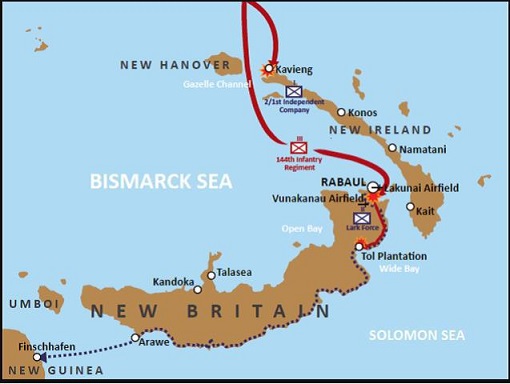
In 1942 Rabaul fell to the Japanese. The dispirited troops were forced to retreat 150km south, through swamps and dense jungle, over rugged mountains. Those who reached Mal Mal were exhausted, hungry, stricken with malaria, with morale dangerously low. Fr Ted gave food and medicine as he was able, but vital as this was, the men’s spirits were lifted even higher by the priest’s cheerful, compassionate nature, and all were inspired by his implacable faith. Thinking the last troops had been through he gave them his sailboat, engine and fuel, but another boat arrived, too big to stay except for the wounded and seriously ill. Several weeks later a rescue ship arrived, and they tried in vain to persuade Fr Ted to escape with them, but he insisted on staying.
Ted insisted that his place was with the native people no matter what the circumstances. Some of the soldiers even planned to take him with them by force.
The Laurabada eventually arrived in Jacquinot Bay on the morning of April 9, 1942. It was decided that it would leave in the evening and the men began to go aboard in the afternoon. Ted shook hands with them all and had a kindly word for each.
One of the officers, Captain David Selby, has written:
The day we were rescued, several of us tried hard to persuade him to come with us, pointing out that if he remained, the Japanese would undoubtedly find out that he had helped us and would be almost certain to kill him, but he steadfastly refused to leave the mission. I think my final conversation with him did more than anything to illustrate his nobility of character and complete sincerity.
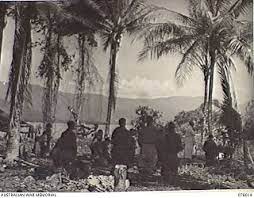
Ted said ‘I came to tell these people what Christianity means. If I deserted them now, could I ever return and preach Christianity again?
Major Owen addressed the troops “Men, we are all bound by duty and obliged to follow the path it points out, no matter into what danger it leads us. We are soldiers, and just as it is our duty to strive by every means to escape and re-join our forces to drive the enemy from our doors, so it is Fr Harris’s duty as a Priest and Missionary to stand by his flock in their hour of need”
It was eight months after the departure of the Laurabada that the Japanese eventually came to Jacquinot Bay. It must have been an anxious time for Ted, not knowing what the future held in store for him but trusting in God no matter what the future might be.
Japanese vessels arrived in Jacquinot Bay on a Sunday morning in December 1942. When Ted saw them, he sent his people into the jungle, and took some trusted native boys to the church where he distributed the Blessed Sacrament to prevent any danger of desecration. When a few Japanese soldiers landed on the jetty, Ted walked down to greet them and invited them to the presbytery for refreshments. He was interrogated by the Japanese officer, who decided to take him to Rabaul. He was escorted to the wharf carrying two black books which are presumed to be his New Testament and his Breviary. The boat pulled away from the Bay and was seen heading to Rabaul. However, it is certain that Ted never reached Rabaul.
It is assumed that on board ship Ted was summarily court-martialled and found guilty of providing assistance to Australian soldiers and being in possession of a radio which he could have used to communicate information to Australian authorities. The normal form of execution was by bayonet followed by shooting if the person was not dead. Ted’s body was thrown overboard and was washed ashore. The Japanese forbade the natives to touch or bury the body, which was then washed out on the ebbtide beyond the reef and never see again.
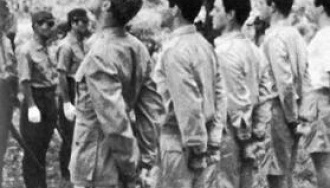
The date of Ted’s execution is either Dec 12, 1942, the date favoured by Dawes, or Dec 21, 1942, the date accepted by the Missionaries of the Sacred Heart.
He was indeed a brave man, as he fully realised the consequences if the Japanese received information that he had assisted the troops. The thought of that did not deter him, and the welfare of the natives and his mission came before his own safety…Father Harris was one of nature’s gentlemen, his cheery disposition and personality was an inspiration and I know that those of us who came in contact with him will not forget him for his great help and sacrifice. (An anonymous sergeant)
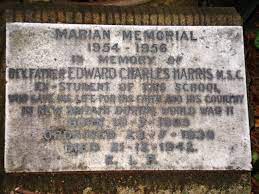
Ted Harris was indeed a remarkable MSC. He lived out to the letter Article 12 of the MSC Constitution:
Following the example of Jesus, we will strive to lead others to God with kindness and gentleness, to unite them to him by love and to free them from fear. Trusting in God’s grace, we will be ready, if necessary, to lay down our lives for them.
Truly he was on earth the Heart of God!

